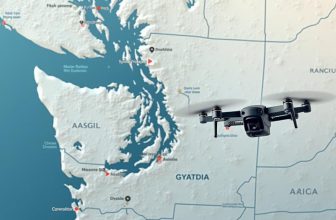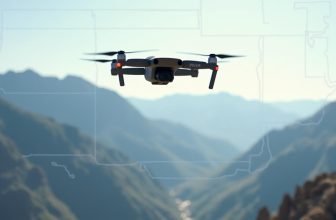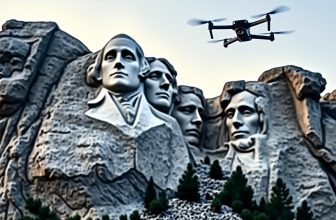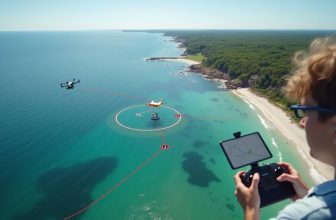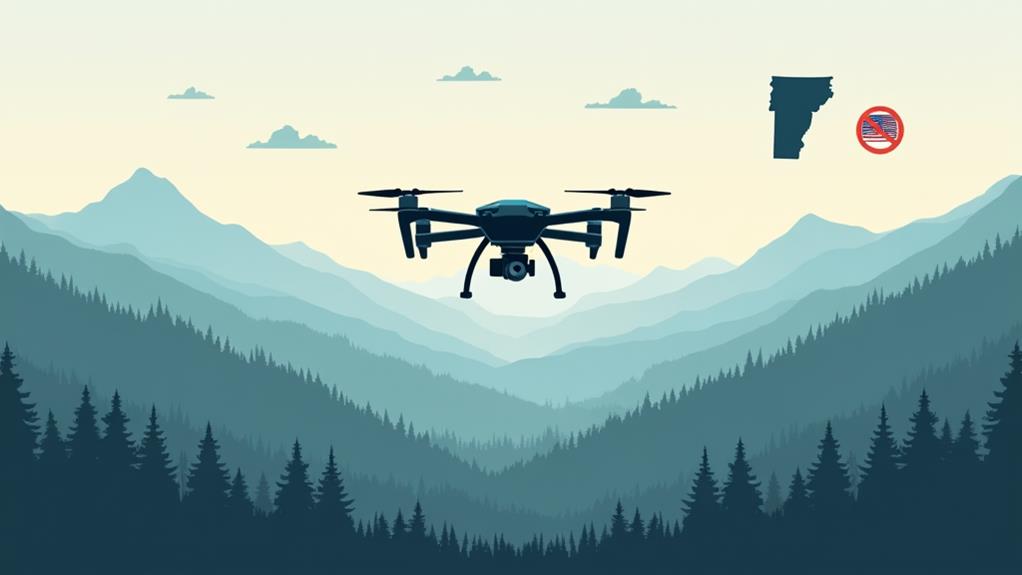
You might think that flying a drone in Vermont is as simple as taking it out of the box and hitting the skies, but that's not the case – there are laws you need to follow to avoid fines and guarantee safe flight. If you're a drone enthusiast in Vermont, you'll want to know the essential laws that apply to you. As a recreational or commercial drone operator, you'll need to navigate regulations around registration, certification, and no-fly zones. But where do you start, and what are the most critical laws to know before you take to the air in Vermont?
Contents
Key Takeaways
- Drone registration with the FAA is required if the drone weighs more than 0.55 pounds in Vermont.
- Restricted airspace in Vermont includes national parks, airport boundaries, and military bases, requiring prior authorization.
- The FAA's B4UFLY app or website should be reviewed before each flight to verify airspace restrictions in Vermont.
- Prior authorization from air traffic control is required before flying near airport boundaries in Vermont.
- Failure to comply with regulations can result in fines or revocation of remote pilot certification in Vermont.
Recreational Drone Operator Regulations
As a recreational drone operator, you're likely aware that flying a drone comes with a set of rules to guarantee public safety and respect for others' privacy.
In the United States, the Federal Aviation Administration (FAA) regulates drone operations, and you must comply with these regulations.
If your drone weighs more than 0.55 pounds, you're required to register it with the FAA. This registration process involves providing basic information about yourself and your drone, and paying a small fee.
The registration is valid for three years, after which you'll need to renew it.
Additionally, you may need to obtain a pilot certification, known as the Part 107 waiver, depending on the type of operation you intend to conduct.
However, if you're flying for recreational purposes only, you may not need to obtain this certification.
Crucial to grasp is familiarizing yourself with the specific regulations that apply to your operations.
You can find detailed information on the FAA's website, which provides clear guidelines on drone registration, pilot certification, and other requirements for recreational drone operators.
Always check the FAA's website for the most up-to-date information.
Commercial Drone Operation Requirements
Operating a drone for commercial purposes brings a new set of regulations to navigate. In Vermont, you'll need to register your drone with the Federal Aviation Administration (FAA) and obtain a remote pilot certification.
The Pilot Certification Process involves passing a knowledge test, which covers topics such as airspace, weather, and aircraft performance. You'll also need to pass a background check by the Transportation Security Administration (TSA).
Additionally, you'll need to comply with specific operational rules, including maintaining a visual line of sight with your drone and not flying over people or in restricted airspace.
You'll also need to have a drone that meets FAA requirements, such as being under 55 pounds and not exceeding 87 knots (100 mph).
Considering Drone Insurance Options is also vital, as it can protect you and your business in case of accidents or damage. Vermont doesn't require drone insurance, but having it can provide peace of mind and financial protection.
Airspace and No-Fly Zones
You've obtained your remote pilot certification and registered your drone with the FAA, but before taking to the skies for commercial purposes, vital understanding of the airspace and no-fly zones is paramount.
Vermont has several areas with restricted airspace that you'll need to be aware of to avoid any potential issues.
Some of the no-fly zones in Vermont include:
- National Parks, such as the Green Mountain National Forest, where drone operations are heavily restricted or prohibited.
- Airport boundaries, including Burlington International Airport and Rutland-Southern Vermont Regional Airport, where you'll need to obtain prior authorization from air traffic control before flying.
- Military bases, such as the Camp Ethan Allen Training Site, where drone operations are strictly prohibited.
Critical review of the FAA's B4UFLY app or website before each flight is necessary to verify you're aware of any airspace restrictions or no-fly zones in the area you plan to fly.
Failure to comply with these regulations can result in fines or even revocation of your remote pilot certification.
Always prioritize safe and responsible drone operation to guarantee a smooth flight.
Frequently Asked Questions
Can I Fly My Drone Over a Neighbor's Property Without Permission?
You risk sparking privacy concerns and potentially committing aerial trespass by flying your drone over a neighbor's property without permission, as they may claim an invasion of their private airspace and right to quiet enjoyment.
Are There Age Restrictions for Drone Operation in Vermont?
You must be at least 13 to operate a drone for recreational use in Vermont, and if you're under 16, you'll need adult supervision; pilot training and youth guidelines are also recommended for safe operation.
Do I Need Insurance to Operate a Drone in Vermont?
You wouldn't need a knight's ransom to operate a drone, but if you use it for business purposes, Vermont recommends liability coverage to protect yourself and others. Check with the state for specific requirements.
Can I Fly My Drone Near a Wildfire or Disaster Area?
When responding to emergencies, you must not fly your drone near a wildfire or disaster area, as it can hinder Fire Safety and Emergency Response efforts, so guarantee you follow FAA guidelines for safe operations.
Are There Any Drone Registration Fees in Vermont?
Bypassing bureaucratic hurdles, you'll find that drone owners in Vermont must pay a federal registration fee, not a state fee, as part of the registration process, which applies to drones weighing over 0.55 pounds.
Conclusion
As you soar through Vermont's picturesque landscape with your drone, remember to navigate its laws with the same care. Imagine the Green Mountains' rolling hills and serene lakeshores – but also envision restricted airspace and no-fly zones. Stay informed and compliant, registering your drone if it's over 0.55 pounds, and adhering to regulations that safeguard both your flight and the state's natural beauty. By doing so, you'll guarantee a safe and enjoyable aerial adventure.



